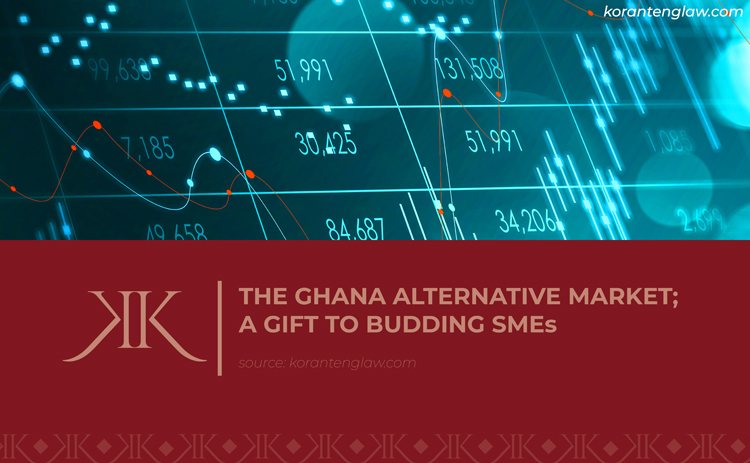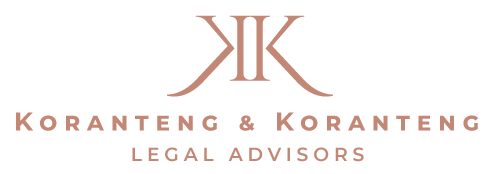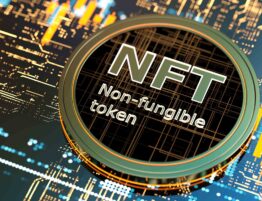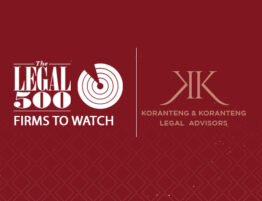
THE GHANA ALTERNATIVE MARKET; A GIFT TO BUDDING SMEs
THE GHANA ALTERNATIVE MARKET; A GIFT TO BUDDING SMEs
medium scale enterprises. The situation is no different in Ghana.
In view of this, the Ghana Stock Exchange (“GSE”), launched the Ghana Alternative Market (GAX) in 2013 which is regulated by the Securities and Exchange Commission (“SEC”), to provide equity financing solutions to businesses with potential for growth, i.e., Small to Medium Enterprises (SME) at various
stages of their development. The key benefits of this bourse include:
- 1. Easier access to long-term capital at a relatively lower cost: GAX provides companies with a platform to access capital over the long term with little to no short-term obligations such as interest or principal repayment on debt instruments.
- 2. Increased Brand Awareness and Enhanced Positioning: Listing on GAX raises the investment community’s awareness of the company and its products which will invariably lead to an enhanced market status and attract general business opportunities.
- 3. Investment Value Realization: The company and its advisors determine the first valuation, offer and listing price. Subsequently, trading among investors determines the price on the market so owners can realize the value of their equity in the company.
- 4. Improvement in the Company’s Financial Position: The injection of equity funds improves the company’s balance sheet, provides capital for expansion and improved profitability and efficiency with the right kind of market discipline and corporate governance.
- 5. Reduce Risk and Improved Liquidity: Equity financing is a less risky method of capital raising since there is no repayment in the form of interest or principal as typically required for debt financing. Also, listing on GAX provides investors with liquidity as their equity can be converted to cash.
More specifically, SMEs in Ghana benefit further due the carefully designed, small business-oriented initiatives aimed at assisting these SMEs in raising capital. The GAX provides the following benefits to SMEs:
- 1. A foolproof Initial Public Offers (IPO): The GAX Rules 2013 provides for mandatory underwriting of the minimum offer either directly or indirectly by the sponsor. This ensures that SMEs are able to have a guaranteed amount should the listing not meet their desired expectations.
- 2. GAX-SME Listing Support Fund: SMEs listing on GAX have access to a revolving fund to support the cost of raising capital and benefit from the deferment of up-front fees due to various professional advisors and relevant third parties. Companies listing on GAX can apply for funds under the GAX-SME listing support fund to pay fully or partly for the cost of advisory services.
- 3. A Waived Listing Fee: Unlike the GSE, where listing and application fees relatively high, GAX only requires listed companies to pay an annual fee currently pegged at GHS 4,000.
- 4. Provision of Collateral Value to Securities: Potential creditors are able to more easily find information on a listed company.
The eligibility criteria for listing on the GAX is as follows:
1. Stated Capital Requirement
A company applying to list on the GAX must have a minimum stated capital of GHS 250,000 at the time of listing. The stated capital of GHS 250,000 shall be the capital after the company’s initial public offer but prior to listing.
2. Public Float
The public float of the applicant must constitute a minimum of twenty-five percent (25%) of the total number of issued shares. Also, the minimum number of public shareholders shall be twenty (20).
3. Period of Existence
Admission may be granted to a start-up company, provided the applicant submits to the GAX a 3- year business plan, clearly demonstrating the business’s viability.
4. Profitability
A company seeking admission to the GAX need not have recorded profits historically but must have the potential to make profit at least at the end of its third year of listing.
5. Sponsorship of Applicants for Listing
Licensed Dealing Members, Investment Advisors or Issuing Houses shall sponsor an application for listing on the GAX.
Despite all these interventions, it appears that SMEs are reluctant in harnessing the opportunities provided by the GAX for a myriad of reasons. As of November 2021, only 6 companies had been listed on GAX, a development which shows the low rate of penetration or interest for this relatively easy capital raising initiative.
A cursory look at the business environment reveals the following as reasons for the low level of listing on
GAX:
Firstly, the small and medium scale Ghanaian enterprise is built on a deep sense of ownership which business owners believe will be infringed on by public ownership through listing. Most business owners thus, view the listing of shares that may give voting rights and decision-making powers to the incoming shareholders/strangers, as an encroachment on their ownership and decision-making powers. As such, these SMEs might only resort to GAX listing when the need for capital is so dire and that reduces their bargaining power and valuation.
Again, as has been the trend in the public sector, most companies are reluctant to share or disclose their business records or accounts. Although the company law of Ghana requires that they file various annual return forms, listing on the GAX would mean they must do so compulsorily and must provide a true and
accurate record of all business endeavors.
In addition, the education on equity financing through listing on the GAX and the detailed process of listing and its benefits is insufficient. It would seem that most SMEs that are the target of GAX are not well sensitized on the value proposition of listing on the GAX and the details of listing requirements.
Conclusion
It appears that for the GAX to fully meet its mandate as a “gift” to SMEs, more work needs to be done in the area of publicity and sensitization and perhaps further expanding the range of benefits and exemptions that an applicant could apply for. The GSE should collaborate with SME- focused government agencies such as the National Youth Employment Agency, Microfinance and Small Loans Centre (MASLOC), the Ghana Chamber of Young Entrepreneurs as well as the National
Entrepreneurship and Innovation Programme and pursue frequent media engagement, to provide the much-needed education on the GAX in Ghana and its benefits.
That being said, SMEs are encouraged to take the plunge to list on GAX as a solution to the elusive capital injection problem. This will enable them to exponentially grow their businesses and turn them around to not just survive, but to thrive.
Written by Abraham Jojo Afun (Koranteng & Koranteng Legal Advisors)








